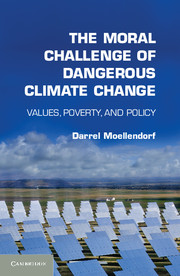Book contents
- Frontmatter
- Dedication
- Contents
- Acknowledgments
- Introduction
- 1 Danger, Poverty, and Human Dignity
- 2 The Value of Biodiversity
- 3 Risks, Uncertainties, and Precaution
- 4 Discounting the Future and the Morality in Climate Change Economics
- 5 The Right to Sustainable Development
- 6 Responsibility and Climate Change Policy
- 7 Urgency and Policy
- Afterword Frankenstorms
- Appendix A The Antipoverty Principle and the Non-Identity Problem
- Appendix B Climate Change and the Human Rights of Future Persons: Assessing Four Philosophical Challenges
- Appendix C The Right to Sustainable Development versus International Paretianism
- Appendix D Declaration on Climate Justice
- Bibliography
- Index
Appendix B - Climate Change and the Human Rights of Future Persons: Assessing Four Philosophical Challenges
Published online by Cambridge University Press: 05 June 2014
- Frontmatter
- Dedication
- Contents
- Acknowledgments
- Introduction
- 1 Danger, Poverty, and Human Dignity
- 2 The Value of Biodiversity
- 3 Risks, Uncertainties, and Precaution
- 4 Discounting the Future and the Morality in Climate Change Economics
- 5 The Right to Sustainable Development
- 6 Responsibility and Climate Change Policy
- 7 Urgency and Policy
- Afterword Frankenstorms
- Appendix A The Antipoverty Principle and the Non-Identity Problem
- Appendix B Climate Change and the Human Rights of Future Persons: Assessing Four Philosophical Challenges
- Appendix C The Right to Sustainable Development versus International Paretianism
- Appendix D Declaration on Climate Justice
- Bibliography
- Index
Summary
In this appendix I examine a model argument, invoking human rights in defense of the duties to future persons to mitigate – and provide adaptation to – climate change. I look at four challenges to the human rights argument. The first three have been pressed in the literature on conceptual grounds. The fourth I formulate on normative grounds. I present what I think are satisfactory responses to the three conceptual challenges. The fourth challenge shows, I think, the limits of the human rights approach for guiding policy. In defending that view I assume that there are important moral duties to mitigate climate change and to provide adaptation assistance, and I take human rights seriously. The issue is whether they alone can guide us in making the kinds of trade-offs that climate change policy seems to require. The antipoverty principle can, I think, do that job.
The Human Rights Argument
In the absence of additional mitigation, climate change is projected to have profound, often devastating, effects on hundreds of millions of people by the end of this century. Much of this has been discussed in the chapters of this book, but there are some reminders relevant to this appendix. First, human health is expected to suffer significantly. According to the Intergovernmental Panel on Climate Change (IPCC), “The health status of millions of people is projected to be affected through, for example, increases in malnutrition; increased deaths, diseases and injury due to extreme weather events; increased burden of diarrheal disease; increased frequency of cardio-respiratory diseases…and the altered spatial distribution of some infectious diseases.” Second, for hundreds of millions of people, access to water and food will become more difficult. By 2020, anywhere from 75 to 250 million Africans are expected to suffer increased water stress, and yields on rain-fed farms may be reduced by up to 50 percent. According to a United Nations Human Development Programme review of climate change projections, “Overall, climate change will lower the incomes and reduce the opportunities of vulnerable populations. By 2080, the number of people at risk of hunger could reach 600 million – twice the number of people living in poverty in sub-Saharan Africa today.”
- Type
- Chapter
- Information
- The Moral Challenge of Dangerous Climate ChangeValues, Poverty, and Policy, pp. 220 - 235Publisher: Cambridge University PressPrint publication year: 2014

